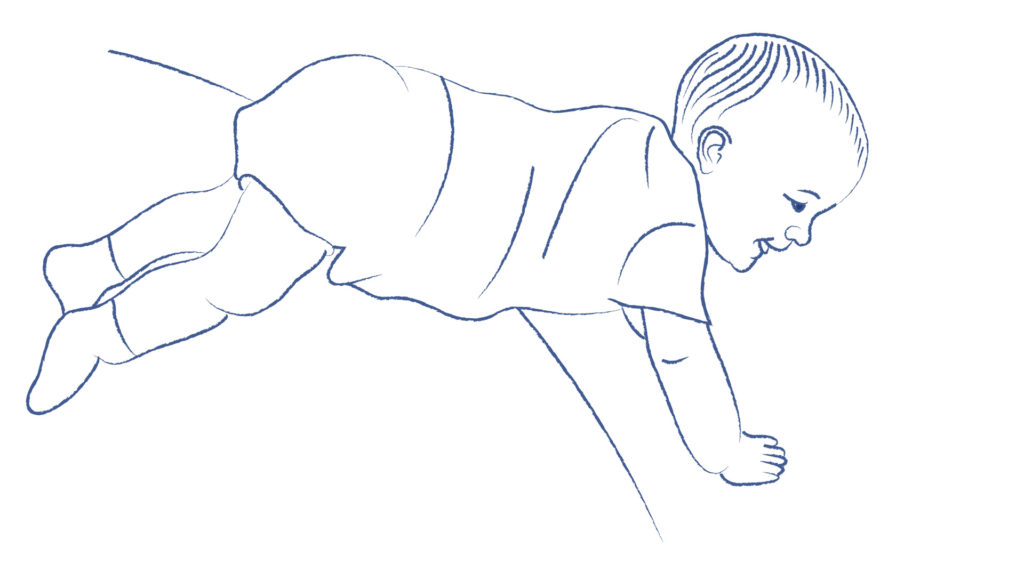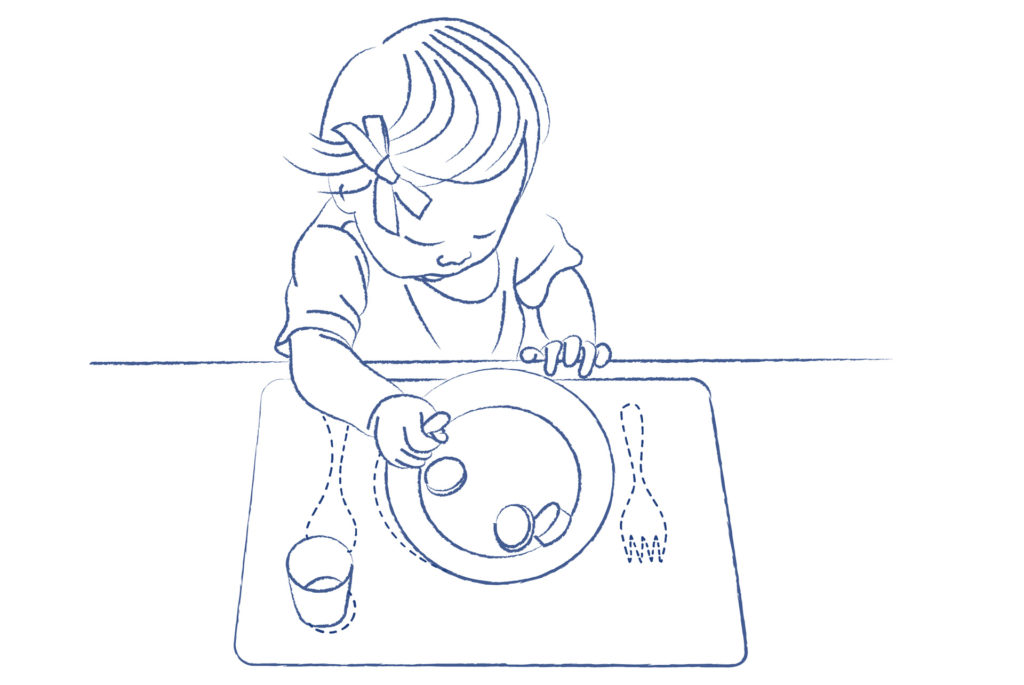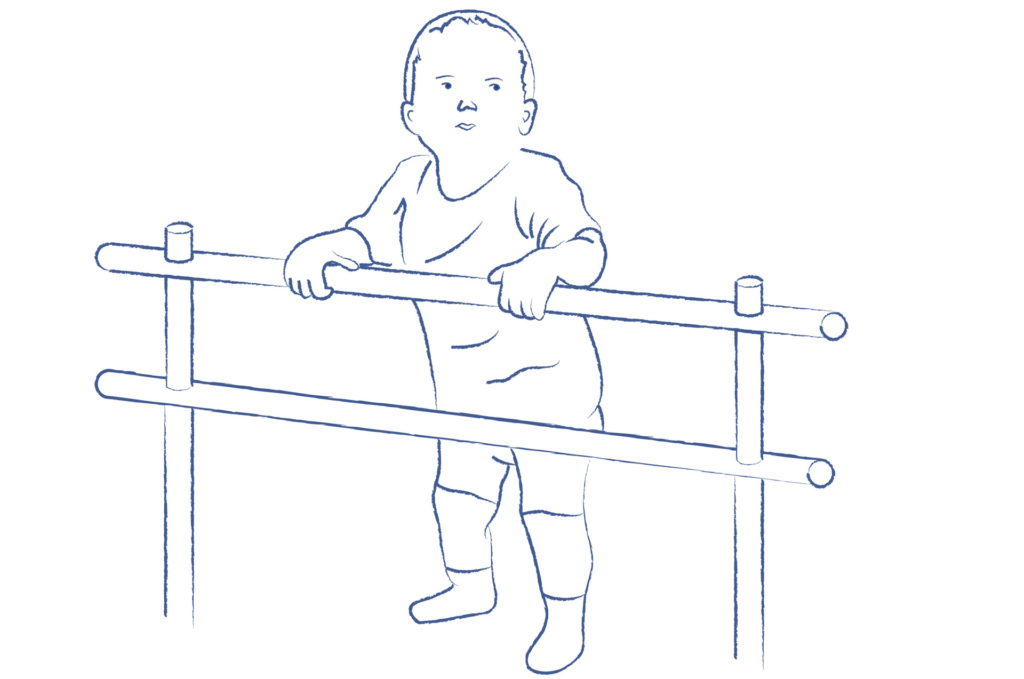When the baby reaches 4-5 months of age and the mother needs either to return to her workplace, or would like some time for herself, the search for an appropriate environment and for the right kind of person to care and look after this most precious baby begins. Dr Montessori believed that the younger the child, the more educated the adult who would be looking after it should be and more attention must be given to providing the infant with the right environment to nurture it. That is why she created a very specific environment for babies from 5 months until approximately 15 months. She chose to name it nido (an Italian word meaning nest). In fact, a nest, is exactly what babies of this age need – a warm family atmosphere – and the nido is a ‘nest’ away from home.
The pedagogical principles which guide our work in the Nest are respect for the rhythm of each baby, to constantly observe all the babies, so as to come to know every little individual, and to respond to the various needs of each and every one. The Assistants to Infancy (as the specially trained adults are called, since their role is to assist infants in their development) observe every infant and respond accordingly to each individual’s need to move in freedom, to hear language spoken well, and to be given appropriate sensorial stimuli. The Nest provides the infant with a home, a safe environment, where she will have the freedom to move, to look at and to touch beautiful objects, to hear lovely songs, rhymes and conversations, together with people whose primary concern is to support her needs.
No doubt, you are wondering how your child will spend her day in the Nest.
Your infant will spend her day in a space full of light, looking onto a garden specially designed for children of this age. Even when your baby is lying down she will want to see, to grasp, to hear and to feel secure in her surroundings so that she may begin to develop her language and movement skills. She will need to move and to act upon her environment, because her mind is active and she is busy absorbing through her senses. Her bright lively eyes are ready to look at all the lovely objects the Assistants to Infancy will offer her. She will explore her world with great curiosity, always searching for new stimuli. Whilst still lying down, your baby will have the possibility of moving freely on a special mat placed before a low mirror, in which she can see and get to know herself. She will look at mobiles, some of which will be hung low enough so that she can reach out and grasp them, and she will respond happily to all the various stimuli that the Assistants to Infancy will introduce.
This is a period where we expect to see many physical and psychological changes. As your infant’s ability to move improves, the environment of the Nest adjusts to offer activities which will help your infant coordinate her movements so that she may begin to crawl, pull herself up, stand and make her first steps. Her interest in her environment is now renewed, and because she is constantly observing, she will want to touch everything!

Her hand is strengthened by moving things around her, by opening and closing doors, by pulling open drawers, by putting stoppers into bottles and so much more. All these activities enable her to acquire more and more skills. We provide many objects and activities which your child is free to manipulate and explore. Whilst exercising her little hands, she will at the same time be gaining in sensorial experiences, because every object that is in the Nest has been chosen with great care, so that it may correspond to the interests of your child.
The Assistants to Infancy have been trained not only to look after your infant’s physical needs but also her psychological needs. They have been trained to communicate with your infant even while she is still unable to speak. In order to support the child’s attempts to communicate through speech, the Assistants to Infancy speak slowly and clearly, naming all the objects in the environment in such a way as to draw the attention of the child who is at the stage of wanting to know the names of everything. They read books appropriate for this age and use the stories to enter into a ‘dance’ of conversation. Everywhere in the environment, there are pictures of objects and of animals representing our real and very beautiful world.
We will listen to music together, play percussion instruments, sing songs and dance. But music is also the patter of rain, the crackle of dry leaves when we step on them, the wind that blows….there is music everywhere and we draw the infants’ attention towards all those natural sounds in the environment.
The children will also have direct access to their own garden, designed especially for children of this age. They will have the possibility to safely explore their natural surroundings, to look up at trees, to hear the song of birds, to smell the flowers and to crawl on grass…. they will even have the chance to climb up little mounds that we have built just for them!
Mothers who are breastfeeding will have the opportunity, if they wish, to come and sit in a special corner that we have prepared for them, for as long as they like. An important change that happens during this time is the weaning process. Introducing the infant to the tastes and food of her environment is a very pleasurable experience. She begins by sampling new flavours, seated at a little table together with an Assistant to Infancy. Gradually the infant begins to care for the environment she finds himself in and we will see her wipe some food or water from the table, peel a tangerine and even take care of herself by wiping her face and washing her hands after every meal. At some point, she will move on to a larger table and sit with other infants so that they may begin to share their meal together and gain a sense of community life.

It is unbelievable how many physical and psychological changes take place in such a young infant in such a short time! Around the age of 15 months, you will notice that your child is building her personality – she starts to speak, she is constantly on the move, wanting to do exactly what you are doing. She imitates your expressions, your movements and begins to repeat what you say, in exactly the same tone of voice! Not only will she start to eat on her own but she will begin to show an increasing interest in her immediate environment. Surely you too have seen it at home, where your child wants to do housework, to do more and more things on her own, and to become involved in a growing number of difficult activities. Your child is going through a very active and creative phase of development and we need to offer her more inspiring stimuli and activities, in order for her to construct her unique personality. The Nest is no longer sufficient. She has grown out of it and now needs to move on – your toddler is ready for a new environment.

